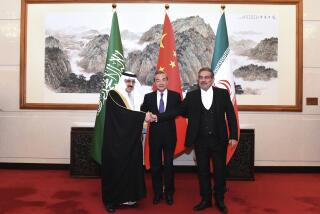Prices of Crude Oil Rise With Tentative Accord by Iran, Iraq
- Share via
VIENNA — Crude oil prices shot up today after a tentative OPEC deal to end a bitter dispute over production between Iran and Iraq and reduce the cartel’s output. Analysts were skeptical that the pact would last.
OPEC ministers predicted that oil prices would jump to $18 a barrel if the accord is signed. But analysts said they did not believe that OPEC members could restrain production for more than a few months, if at all.
The widely traded non-OPEC oil, North Sea Brent blend for January delivery, rose strongly in European trading today to $14.30 a barrel, up $1.55 from $12.75 at Thursday’s close.
The New York Mercantile Exchange, an oil futures market, was closed for the day but some trading was taking place in the New York cash market for spot-delivery oil. In the cash market, the benchmark West Texas Intermediate traded at $15.30 a barrel in early morning, up from its Wednesday close of $14.10 ahead of the Thanksgiving holiday.
A rise to $18 a barrel theoretically could add up to 10 cents to the price of a gallon of gasoline, but analysts said they doubted that would happen because retail prices did not fall during the recent slump in crude prices.
Tentative Agreement
The tentative deal worked out by the ministers of the 13-nation Organization of Petroleum Exporting Countries to limit their production next year was announced late Thursday (Story, Page 7.)
Iran’s oil minister, Gholamreza Aghazadeh, flew to Tehran today to get his government’s approval for the pact, which would set a limit on OPEC’s production at 18.5 million barrels a day in the first half of 1989.
Analysts estimate that OPEC has been producing more than 21 million barrels a day recently, far above the cartel’s current cap of about 15 million barrels.
The cartel today postponed a formal session of its 13 oil ministers until Saturday evening to allow time for them to brief their governments on details of the package. But some delegates believe talks may not resume until Sunday.
Pushing Prices Back
Issam Abdul-Rahim Chalabi, the Iraqi minister, expressed confidence that the agreement would push crude prices back to OPEC’s benchmark of $18 a barrel. “I think we can reach that ($18 price) within a few months,” Chalabi said.
But analysts remained skeptical that an accord would lead to $18 oil in the near future.
“If they have an agreement, the market will take it as a good deal and prices will go up,” said Cyrus Tahmassebi, an economist for Ashland Oil Inc. “But once the realities of the market hit, prices will come down again, and sharply.”
Tahmassebi said that among the realities are the fact that the market needs only about 17 million barrels a day of oil from OPEC, well below the 18.5-million cap the cartel proposed.
The major stumbling block to the accord, which would replace one drawn up in 1986, has been the Iran-Iraq dispute.
Iraq has been insisting that its production quota, or ceiling, in any new pact be the same as Iran’s, but Aghazadeh repeatedly refused to cooperate.
It was not known exactly how that dispute was resolved.
More to Read
Inside the business of entertainment
The Wide Shot brings you news, analysis and insights on everything from streaming wars to production — and what it all means for the future.
You may occasionally receive promotional content from the Los Angeles Times.










